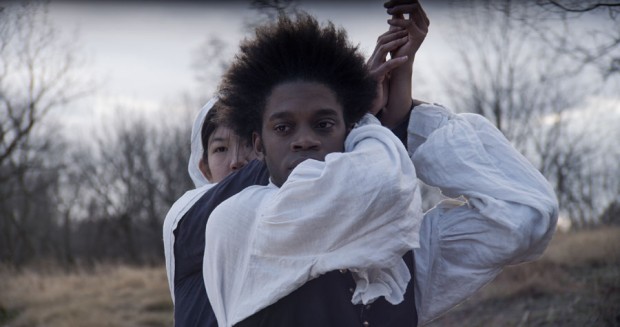
Katy Pyle, Jules Skloot and Cat Tyc will present an excerpt of The Firebird, and a short working version of the documentary that Cat is currently creating about the Ballez Company and their work on teaching the show to new performers. This version of The Firebird redefines traditional gender roles and expectations of a classic form. Pyle deconstructs balletic elements and reconstitutes them into a community-oriented, gender-fluid, queer utopian vision of what is possible in dance.
Katy Pyle is a multimedia performance artist whose works explore transformation, queer failure, and the lineage of performance. Pyle began studying ballet as a child in Austin, and furthered her training in high school at North Carolina School of the Arts. She went on to study modern dance at NCSA, and then post-modern dance and Multimedia Performance Art at Hollins. Pyle moved to New York in 2002, and her performance works have been presented at Brooklyn Arts Exchange, Danspace Project at St. Mark’s Church, PS122, La Mama, Dance Theater Workshop, Movement Research at the Judson Church, and the Bushwick Starr. She has been in collaborative processes with Ivy Baldwin, Faye Driscoll, John Jasperse, Karinne Keithley Syers, Jennifer Monson, Anna Sperber, Katie Workum, and Young Jean Lee Theater Company. She’s received creative support from Brooklyn Arts Exchange (BAX), Dragon’s Egg, Rockbridge Artist’s Exchange, and Mount Tremper Arts.
J. Makary‘s current project, Sung’s Pilgrims, is an experimental narrative film exploring Colonial-era reenactment through the experiences of two characters who find their role-playing options limited by the color of their skin. Irene Sung is a Chinese-American historian who manages the museum at the fictional Preyerhill House. She wants to become a reenactor at the site but won’t allow it, acknowledging that her ethnicity is anachronistic to the Colonial period. Hollis Tobey, a traveling actor and orator, arrives at Preyerhill with his one-man show in a trunk. His stage persona, a wealthy Colonial businessman, is based on a real historical figure. However, Hollis provocatively alters the historical record as a black male actor playing a character in a status role that was only accorded to whites at the time. Equal parts research project, devised theater experiment, and public history exploration, Sung’s Pilgrims dramatizes what happens when a reenactor’s chosen character cannot be validated by the historical record.
J. Louise Makary’s first film debuted at the American Dance Festival in 2006. Since then, she has developed projects influenced by video art, classic and experimental cinema, and contemporary dance. From 2008 to 2010, she was artist-in-residence at the Philadelphia Society for the Preservation of Landmarks through their Contemporary Projects initiative. Her residency culminated in a solo exhibition at Powel House Museum in 2010 and fostered in her practice an enduring interest in the ways that films can bring to light issues in public history. Makary’s films and videos have been exhibited at the Institute of Contemporary Art, the Slought Foundation, Bartram’s Garden, NEXUS, and International House, all in Philadelphia; SPACES in Cleveland, Ohio; Rowan University in Glassboro, New Jersey; and Zodiak Center for New Dance in Helsinki, Finland. Originally trained as a writer and editor at the Medill School of Journalism at Northwestern University, Makary recently earned an MFA in film at Temple University. In 2013, Makary was named a Pew Fellow in the Arts. Examples of her work can be seen at www.jmakary.com.



